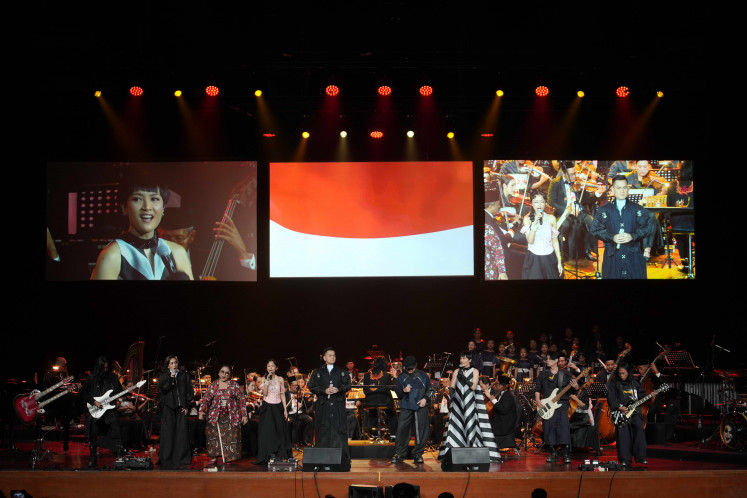Popular Reads
Top Results
Can't find what you're looking for?
View all search resultsPopular Reads
Top Results
Can't find what you're looking for?
View all search results'Gandari' takes shape in human rights struggle
Into the rhythm: Dancers take over the stage during the Gandari opera, with Dutchâs Asko|Schönberg-Slagwerk Den Haag orchestra, led by Dutch conductor Bas Wiegers, performed in the background
Change text size
Gift Premium Articles
to Anyone
Into the rhythm: Dancers take over the stage during the Gandari opera, with Dutch's Asko|Schönberg-Slagwerk Den Haag orchestra, led by Dutch conductor Bas Wiegers, performed in the background. The opera is staged on Friday and Saturday at the Taman Ismail Marzuki cultural center in Central Jakarta.
Three countries, 25 musicians, six dancers, two narrators and a soloist took the stage by storm on Friday night.
The performers of dance opera Gandari built in turns the atmosphere of despair, anger, struggle and hope, captivating the audience.
As the production involves diverse forms of art and artists from different nations, there are a lot of things going on at the same time on the stage.
For the performance, held only on Friday and Saturday at Teater Jakarta in the Taman Ismail Marzuki arts center, Central Jakarta, the orchestra pit has been moved up on to the stage and becomes the center of the set.
Dutch contemporary-music ensemble Asko Schönberg and Slagwerk Den Haag, also known as The Hague Percussion, are positioned on a boat wreck designed by installation artist Teguh Ostenrik.
The Batavia Madrigal Singers choral group take their place in the background to create a surround effect for their vocals.
A lemongrass tower made of wire frame stands near the boat, a prop for soloist Katrien Baerst who climbs to the top in some scenes.
The most captivating performances are those of the dancers. Choreographed by Japanese Akiko Kitamura, the dance is full of life with steps resembling pencak silat, a traditional Indonesian martial art.
Japanese dancers Yuki Nishiyama, Llon Kawai, Kana Ote and Indonesian Danang Pamungkas, Rianto and Luluk Arie Prasetyo are dynamic on stage with or without music.
The music itself is the foundation of the production. Written by the country's noted contemporary composer Tony Prabowo, the music adopts the sounds of traditional musical instruments.
Asko conductor Bas Wiegers said that although they used western instruments, the beats produced by the percussion and piano were unmistakably the sound of gamelan, recognized by the dancers who relied on the sounds as their cues.
But the main element that brings the performance together as a whole is the story.
A musical adaption of Goenawan Mohamad's poem 'Gandari', the story revolves around the mother of the Kurawa brothers, the antagonists of the Mahabharata epic.
'This character is often overlooked, but Goenawan presented the other side of her. She is a mother who has to see her sons die in the battle one by one and decides to close her eyes to the world,' said Tony, who initiated the opera produced by the Taut Seni Foundation together with Djarum Apresiasi Budaya.
The story is told in melodious dialogue by Landung Simatupang and Sita Nursanti while the poem is sung in Indonesian by Katrien Baerst.
Helmed by Yudi Ahmad Tajudin, the country's most celebrated contemporary director, the eponymous Gandari has been translated to the social conditions of today to connect with the audience.
Near the climax, human rights activist Maria Catarina Sumarsih appears on the stage to tell her own story of losing her only son Benardinus Realino Norma Irawan, or Wawan, a student protester who was shot dead in 1998.
The case went nowhere.
Maria is among the mothers and relatives of human rights victims who have gathered outside the Presidential Palace every Thursday since 2007 in their demand for justice.
The hour-long opera is in line with the commemoration of Human Rights Day on Dec. 10, giving out the strong message of hope for a grieving nation.
' Photos by JP/Ricky Yudhistira











